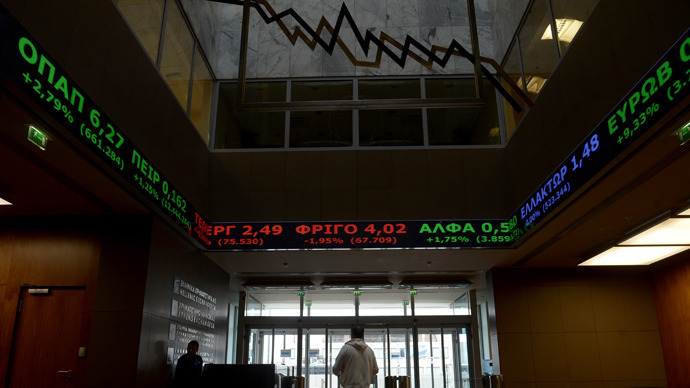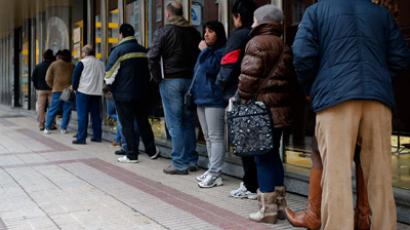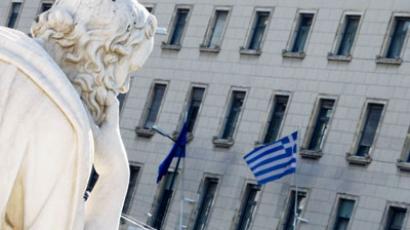First deflation in over 40 years hits Greece, reminder of recession reality

Greece’s consumer price indexes have decreased 0.2%, marking the first deflation since 1968. It might mean the peripheral euro economy may be in more trouble- if the trend continues Greece will amass even more debt.
The Hellenic Statistical Authority released data Tuesday in
an official press release.
The deflation is linked strictly to the consumer sector, as service providers have been forced to cut their prices due to an overall decline in consumption. As Greece enters year 5 of recession, people just aren’t buying.
The telecommunications sector, for example, has deflated by 5.1%, and the health Consumer Price Index (CPI) has dropped by 4.6%. Other industries have remained unaffected or have even increased.
CPI hasn’t changed drastically compared to February 2013, with the exception of clothing and footwear, which has jumped up 33.4%.
The deflationary trend is expected to continue for several months before stabilizing, according to Michael Massourakis, chief economist at Alpha Bank.
“If we don’t see further tax or energy price increases, the recent decline in labor costs will have a negative impact on prices,” said Massourakis.
For some, the news doesn’t come as a surprise, and is a ripple effect an economy that has been rapidly contracting since 2008.
"It's more of a surprise that it [deflation] did not happen sooner," said Ben May, an economist at Capital Economics, describing falling prices as a "double edged sword".
Does Greekness have to be a weakness?
Consumer prices aside, Greece has shown a comprehensive price increase of 2.5%, but analysts are really fixated on the 0.2% deflation criterion.
This minute economic shift has met mixed reactions in Greece, which has experienced constant inflation, and not deflation, since 1968.
Deflation in consumer price index is excellent news for Greek exporters, who can gain a competitive edge in the export market, and also behooves cash-strapped consumers, whose purchasing power has slightly increased.
The falling prices are distressing for government officials, because if they continue on a downward trajectory, it means Greece will amass more debt, and force lenders into steeper losses.
The CPI is often used as an economic indicator, a sort of ‘test’ of how effective government economic policy is, and, it seems, Greece isn’t passing.
"Given the still dire economic environment, we expect consumer price inflation to remain negative during the rest of the year," said Diego Iscaro, economist at IHS Global Insight.
State of the State
The country has been in economic turmoil since crisis hit 2008. All the numbers coming from Greece are ominous. GDP is shrinking, and has fallen by 22% in the last 5 years and is expected to drop another 4.5% as Greece enters its 6th year of recession.
Unemployment is 27% and a portion of the labor force has already
left in search of work. The economy is propped up on over 100
billion euros of EU aid.
Greece is “in a critical situation”, according to Prime
Minister Antonis Samaras















